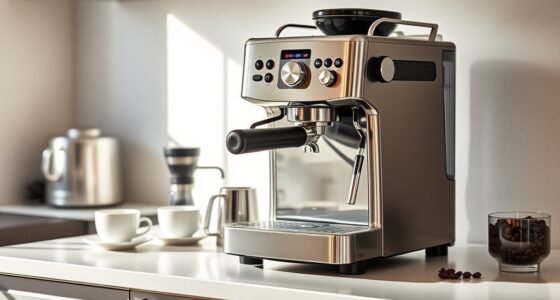If you’re looking for the 13 best CMMs that offer excellent precision and reliability, I recommend checking out advanced tools like laser measurement devices, durable stylus and probe systems, and precise tramming setups. These products are designed for industrial accuracy, easy calibration, and tough environments. From long-range laser meters to high-quality ruby and ceramic probes, these solutions meet strict industry standards. Keep exploring to find out more about these reliable options.
Key Takeaways
- High-precision CMMs utilize durable probes and styluses made of carbide and ruby for accurate measurements in industrial environments.
- Advanced CMM models feature reliable calibration tools like tramming systems and digital dial indicators for optimal accuracy.
- Compatibility with power adapters and accessories ensures continuous operation and seamless integration into manufacturing workflows.
- Industry standards such as ANSI/ASME B89.4.22-2004 guide the performance, repeatability, and reliability of top CMM systems.
- Leading CMMs combine robust construction, precise measurement capabilities, and user-friendly features for industrial, aerospace, and medical applications.
Dual Laser Measurement Tool, 393Ft/120M Bilateral Laser Distance Meter
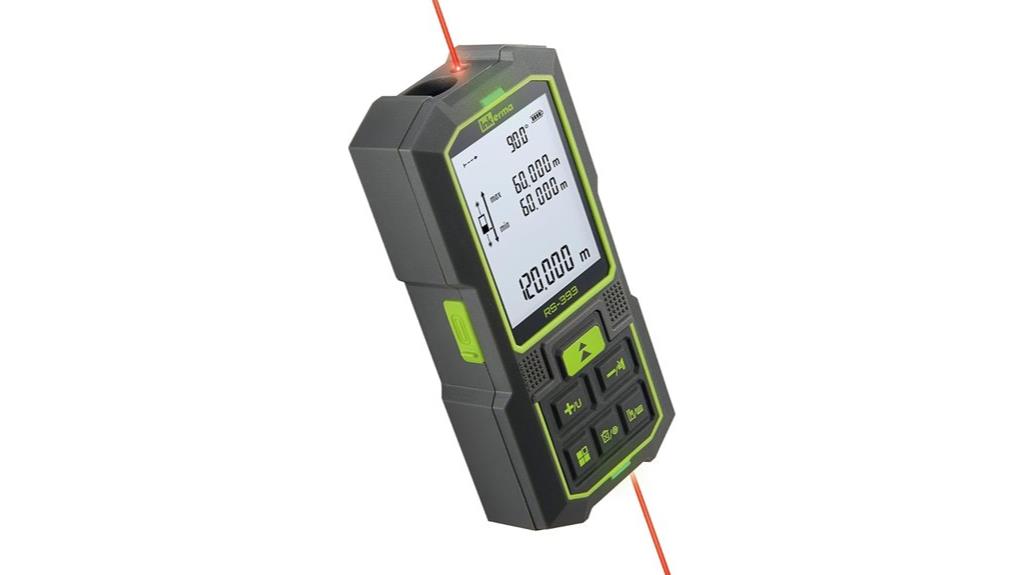
If you’re looking for a highly efficient measuring tool, the Inkerma Dual Laser Measurement Tool is an excellent choice, especially for professionals who need quick, accurate readings over long distances. With a bilateral laser system, it measures in two directions simultaneously, reaching up to 393 feet (120 meters) with 2mm accuracy. Its versatile modes include area, volume, and angle calculations, making complex tasks straightforward. The device is lightweight, rechargeable, and supports over 5000 measurements per charge. Its intuitive interface and durable design make it perfect for construction, factory work, or DIY projects, providing reliable results quickly and easily.
Best For: professionals and DIY enthusiasts who require quick, precise, and long-distance measurements for construction, factory, or home projects.
Pros:
- High measurement range of up to 393 feet (120 meters) with 2mm accuracy
- Supports multiple measurement modes including area, volume, and angle calculations
- Rechargeable battery capable of over 5000 measurements per charge with a portable, durable design
Cons:
- Some users find the buttons stiff and challenging to operate smoothly
- Surface sensitivity issues on bright or colored surfaces can affect accuracy
- Slightly complex interface may require time to fully master all functions
CMM Touch Probe Stylus for Renishaw A-5003-0577
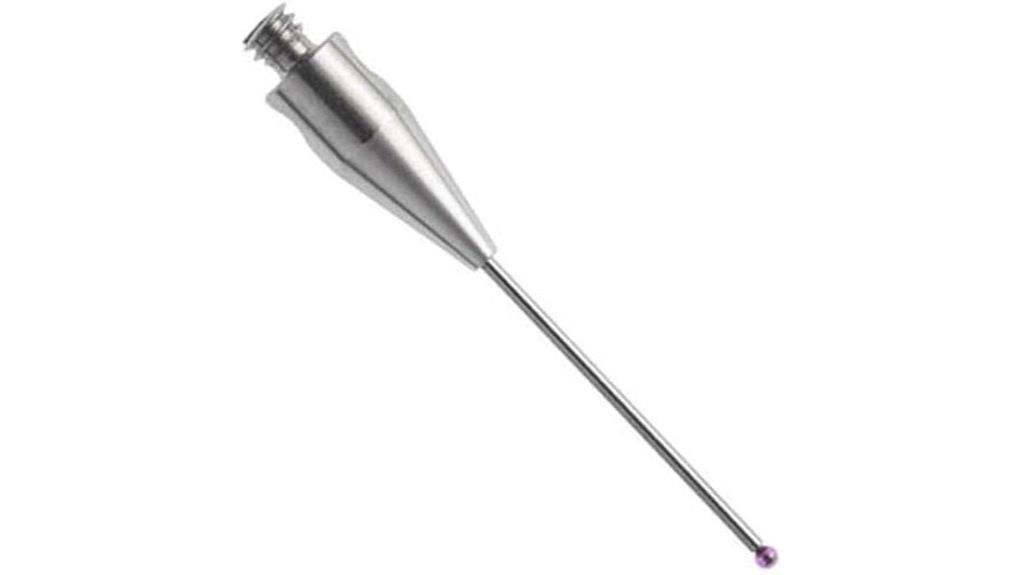
The CMM Touch Probe Stylus A-5003-0577 is an ideal choice for professionals seeking high-precision inspection tools, especially when working with coordinate measuring machines that accept M2 threaded accessories. Its 0.7mm ruby-ball tip mounted on a carbide rod guarantees exceptional accuracy, stiffness, and wear resistance. With a total length of 20mm and an effective working length of 12mm, it balances access to tight spaces with measurement stability. Constructed from premium carbide, it offers durability under demanding conditions, while the industry-standard ruby tip maintains long-term measurement integrity. This stylus is perfect for manufacturing inspection, quality control, and precise measurement tasks across various industries.
Best For: professionals and technicians requiring high-precision measurement tools for coordinate measuring machines and quality control systems across various industries.
Pros:
- Offers exceptional accuracy and wear resistance with a ruby-ball tip mounted on a carbide rod.
- Compact design with a total length of 20mm and an effective working length of 12mm, ideal for tight spaces.
- Durable construction from premium carbide ensures long-term performance under demanding conditions.
Cons:
- Compatible only with machines accepting M2 threaded accessories, limiting versatility.
- The small size and delicate tip may require careful handling to prevent damage during use.
- May be more expensive than standard styluses due to high-quality materials and precision engineering.
Mill & Lathe Tramming System for Machine Calibration with Digital Dial Indicators
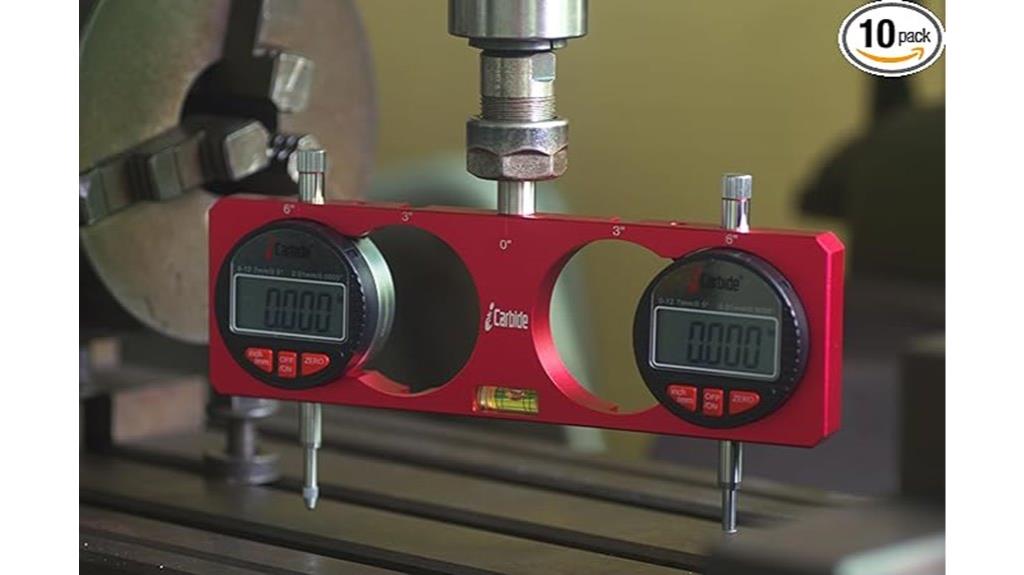
A Mill & Lathe Tramming System with digital dial indicators is essential for professionals who demand precise machine calibration. It guarantees accurate alignment of the spindle and bed, eliminating misalignments that can compromise machining quality. Equipped with two high-quality iCarbide digital dial indicators, it detects even the smallest deviations with .0005” (0.01mm) resolution. Made from durable 6061 aluminum with a hard anodized finish, this system offers long-lasting reliability. Verified by CMM for tight tolerances, it provides confident calibration for CNC setups and precision machining. Its robust build and accuracy make it an invaluable tool for achieving smoother, more precise results consistently.
Best For: Professional machinists and CNC operators seeking precise machine calibration for optimal machining accuracy and smooth operation.
Pros:
- High-resolution digital indicators (.0005” / 0.01mm) for detecting minute misalignments
- Durable construction from rugged 6061 aluminum with hard anodized finish for long-term reliability
- Verified by CMM for tight tolerances, ensuring accurate and consistent calibration
Cons:
- May require some training or experience to use effectively for beginners
- Slightly higher cost due to premium materials and precise components
- Not necessarily suitable for casual or hobbyist use due to its professional-grade features
CMM Probe Stainless Steel Ceramic Stem 6mm Ball
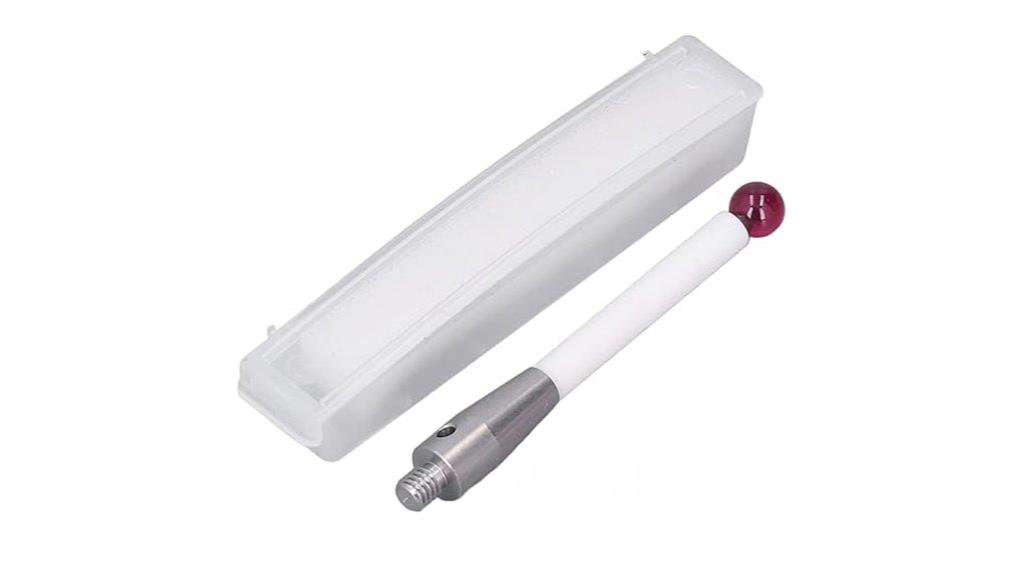
Designed specifically for high-precision industrial measurements, the CMM Probe with a stainless steel ceramic stem and a 6mm ball tip offers exceptional durability and stability. Its M4 threaded connection guarantees secure attachment to three-coordinate machine tools, making it ideal for demanding environments. Crafted from high-grade stainless steel and ceramic, it combines strength, lightweight support, and corrosion resistance. The high-precision 6mm ball tip provides excellent wear resistance and long service life, while the ceramic stem maintains stiffness and absorbs impacts during accidental crashes. With a total length of about 50mm and a protective storage box, this probe ensures consistent, reliable performance for precise measurements.
Best For: professionals in industrial measurement and quality control requiring highly durable and precise CMM probes for demanding environments.
Pros:
- Made from high-grade stainless steel and ceramic for enhanced durability and corrosion resistance
- Features a high-precision 6mm ball tip for long-lasting wear resistance
- Supports secure attachment with M4 threaded connection, ensuring stable measurements
Cons:
- Total length of approximately 50mm may limit access in very tight spaces
- Ceramic stem, while impact-absorbing, can be brittle if subjected to excessive force
- Requires careful handling during installation and use to prevent damage to the ceramic component
18V AC/DC Adapter for Faro Edge Model 14000 ScanArm
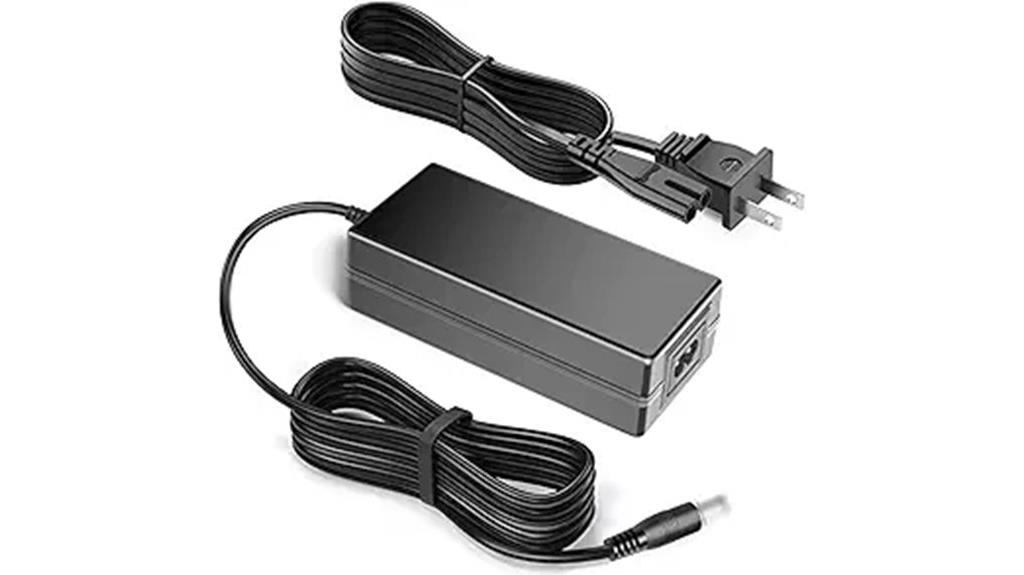
If you’re using the Faro Edge Model 14000 ScanArm, an 18V AC/DC adapter becomes essential for reliable, portable power. This high-quality adapter is compatible with the Faro Edge and similar devices, providing a steady 18V DC output. Its built-in safety features, like a dynamic IC, charger IC, and fuse, ensure rapid charging and overcharge protection. With a wide input voltage range of 100V-240V AC, it works worldwide, making it perfect for replacement or travel backup. The package includes a power cord, cable, battery charger, and PSU, offering everything needed for seamless operation and dependable performance wherever you go.
Best For: professionals and technicians using the Faro Edge Model 14000 ScanArm who need a reliable, portable power solution for their device.
Pros:
- Compatible with Faro Edge Model 14000 ScanArm and similar devices requiring 18V power
- Wide input voltage range (100V-240V AC) suitable for global use and travel
- Built-in safety features including dynamic IC, charger IC, and fuse for rapid charging and overcharge protection
Cons:
- Requires proper connection and handling to ensure safety and device compatibility
- May be incompatible with devices requiring different voltage or power specifications
- Bulkier than small portable batteries, potentially less convenient for very compact setups
18V AC-DC Adapter Replacement for Faro Edge Model: 14000 ScanArm
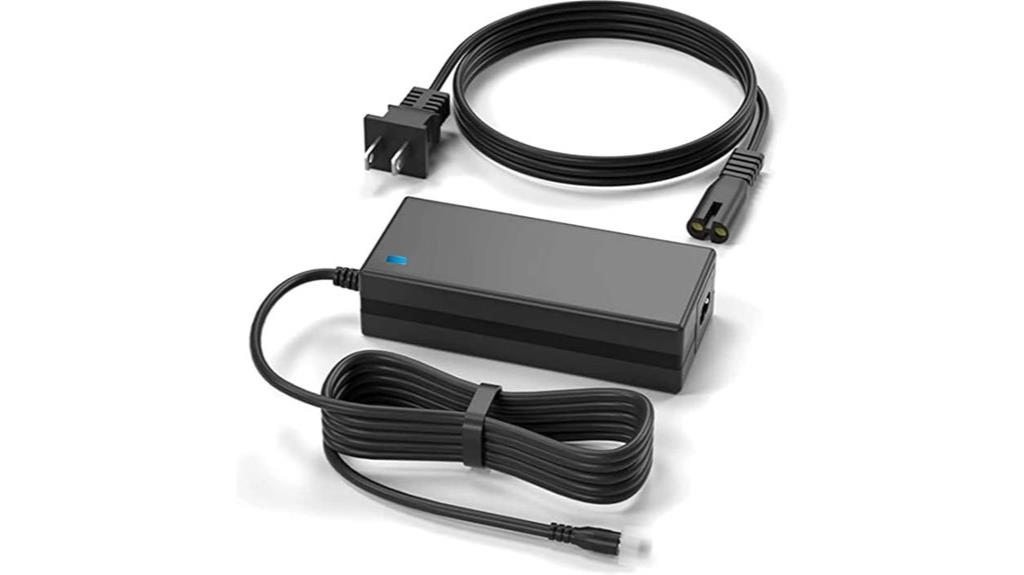
The V AC-DC Adapter Replacement for Faro Edge Model: 14000 ScanArm is an essential accessory for professionals who rely on precise and reliable power sources. This high-quality adapter converts AC power into 18V DC, guaranteeing compatibility with Faro Edge and similar devices. Built with safety features like Over Voltage and Over Heat Protection, it guarantees dependable operation. Compact and portable, it’s perfect for on-the-go use, whether in the workshop or field. Manufactured by Shenzhen Waweis Technology Co., Ltd., it’s tested and validated for peak performance. Having a reliable power supply like this ensures your Faro Edge operates smoothly, minimizing downtime and maintaining measurement accuracy.
Best For: professionals and technicians needing a reliable, portable power supply for Faro Edge Model 14000 ScanArm and similar measurement devices in workshop or field environments.
Pros:
- Converts AC to 18V DC with high compatibility for Faro Edge and related devices
- Equipped with safety features like Over Voltage and Over Heat Protection for reliable operation
- Compact, lightweight, and portable, ideal for on-the-go use in various settings
Cons:
- May require additional adapters or connectors for specific device models
- Limited to devices compatible with 18V DC power supply specifications
- As a replacement part, it depends on proper connection and setup to ensure optimal performance
ANSI/ASME B89.4.22-2004 Methods for Performance Evaluation of Articulated Arm Coordinate Measuring Machines (CMM)
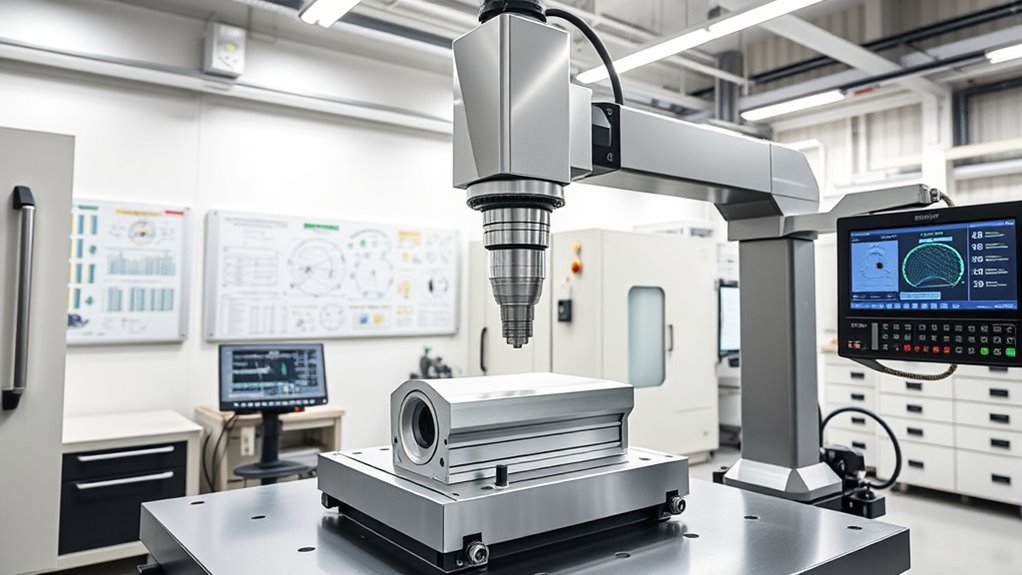
When evaluating articulated arm CMMs, guaranteeing the ANSI/ASME B89.4.22-2004 standards ensures accurate and reliable performance assessments. This standard provides essential guidelines for testing and verifying CMM accuracy, repeatability, and overall functionality. By following these methods, I can confidently compare different models and ensure they meet industry benchmarks. The standard’s structured approach helps identify potential issues before deployment, minimizing measurement errors. Adhering to ANSI/ASME B89.4.22-2004 is vital for maintaining quality, ensuring precision, and delivering trustworthy results in high-precision measurement tasks.
Best For: professionals and organizations seeking to ensure accurate, reliable performance evaluation of articulated arm CMMs in compliance with industry standards.
Pros:
- Provides comprehensive guidelines for testing and verifying CMM accuracy and repeatability
- Helps identify potential issues early, reducing measurement errors
- Ensures compliance with recognized industry benchmarks for high-precision measurement tasks
Cons:
- May require specialized knowledge to properly implement the testing procedures
- The standard’s detailed approach could be time-consuming to follow thoroughly
- Limited to articulated arm CMMs, not applicable to other types of measurement equipment
Hardened Alloy Carbide CMM Probe for Coordinate Measuring Machine
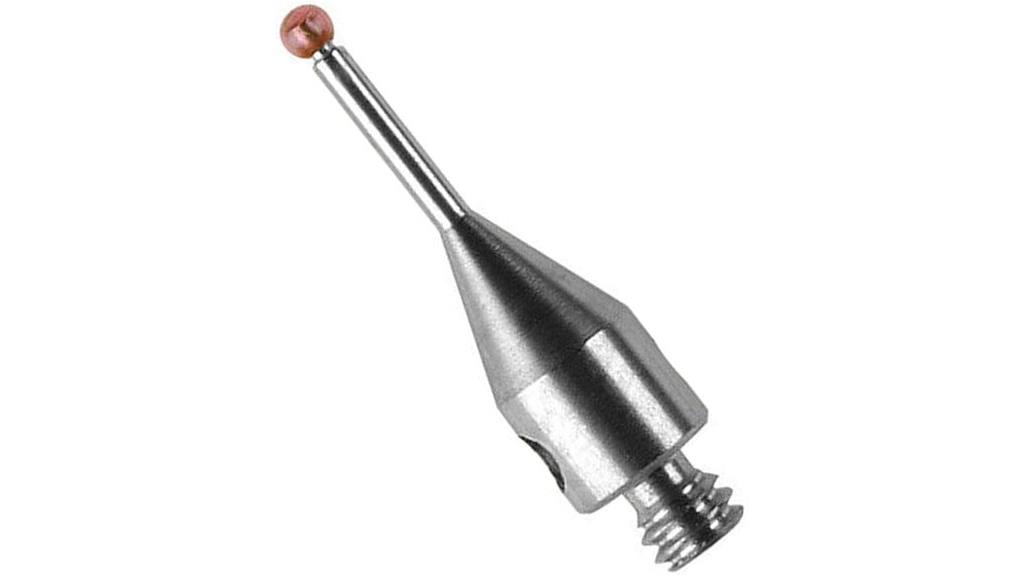
A hardened alloy carbide CMM probe stylus tip stands out as an essential component for industries demanding high precision and durability. Designed with a 1mm diameter ball and a 10mm length, the Model A-5000-7806 ensures accurate measurements across various applications. Made from hardened alloy carbide, it offers exceptional stiffness, wear resistance, and long-lasting performance, even in tough environments. Its non-magnetic, non-conductive properties, achieved through silicon carbide and EDM processes, resist abrasive wear. Compatible with multiple CMM systems, the straight stylus enables reliable contact with simple features and tight spaces, making it ideal for manufacturing, aerospace, automotive, and medical industries.
Best For: industries requiring high-precision measurements and durable probing solutions, such as manufacturing, aerospace, automotive, and medical device sectors.
Pros:
- Made from hardened alloy carbide for exceptional wear resistance and longevity
- Non-magnetic and non-conductive properties prevent interference during measurements
- Compatible with various CMM systems and suitable for tight spaces and intricate parts
Cons:
- Small size (0.7mm diameter) may require careful handling and precise installation
- Limited to simple feature inspection due to straight stylus design
- May need replacement after extensive use in highly abrasive environments
CMM Touch Probe M3 Thread Shank with Ruby Ball for Coordinate Measuring Machine
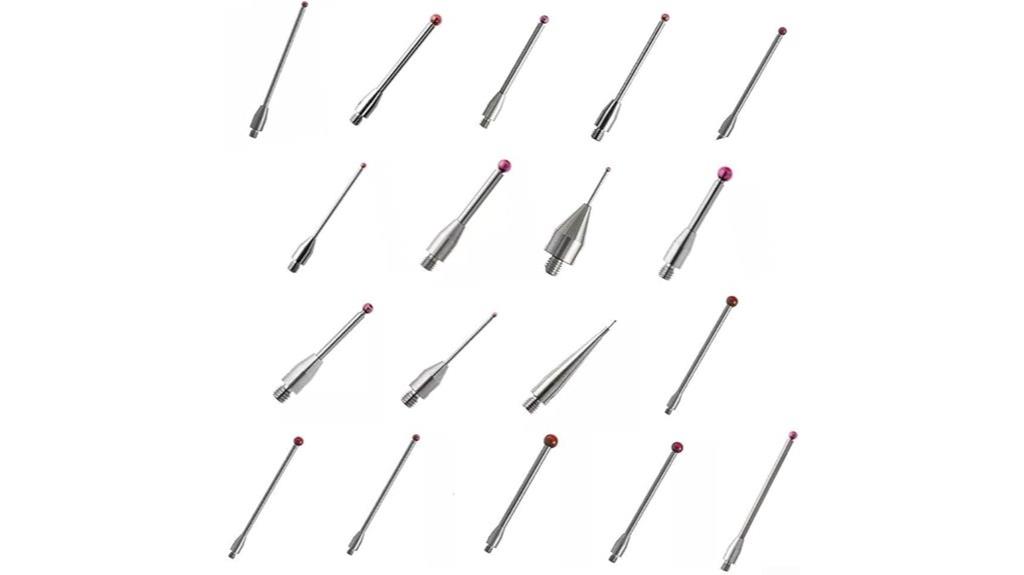
For professionals seeking precise and durable measurement tools, the CMM Touch Probe M3 Thread Shank with Ruby Ball stands out due to its robust carbide stem, which guarantees long-lasting wear resistance. Its lightweight design makes handling easier during complex measuring tasks. The ruby ball tip ensures stable, accurate readings, even under temperature fluctuations, making it ideal for high-precision engineering and quality control. Equipped with anti-collision technology, it minimizes accidental damage, increasing longevity. Suitable for measuring silicon carbide surfaces and EDM components, this probe offers versatile application options. Always verify the size chart and specifications to select the best fit for your specific measurement needs.
Best For: professionals requiring precise, durable measurement tools for complex engineering, quality control, and industrial applications.
Pros:
- Durable carbide stem offers excellent wear resistance for long-term use
- Ruby ball tip provides stable, accurate measurements even with temperature changes
- Equipped with anti-collision technology to prevent damage during complex tasks
Cons:
- May require consultation of size chart for proper model selection
- Limited to specific measurement surfaces like silicon carbide and EDM components
- Availability of multiple specifications might complicate choosing the optimal model
CMM Probe for Coordinate Measuring Machine
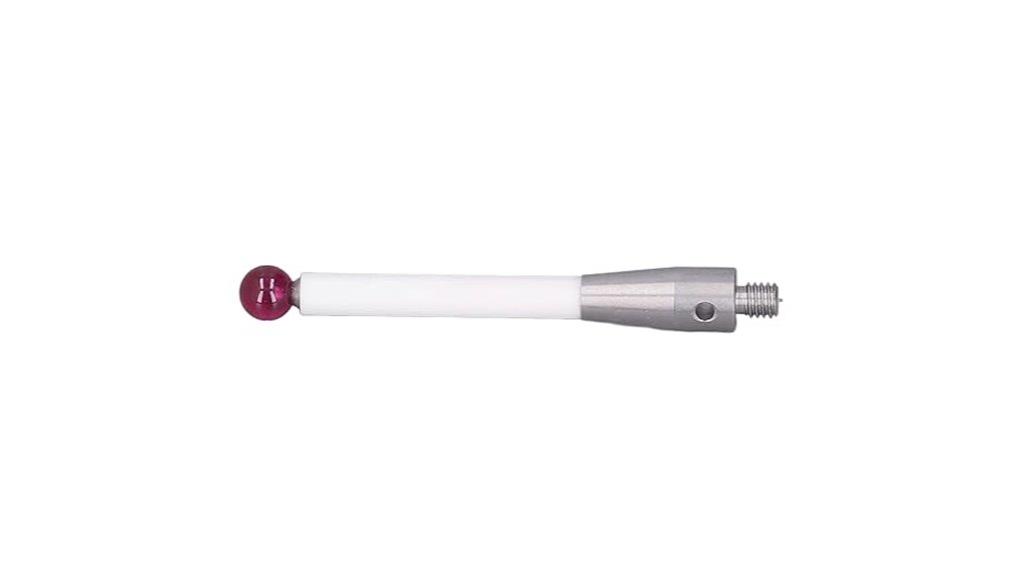
The CMM probe stands out with its premium construction, combining stainless steel and ceramic materials to guarantee high durability and precision. The ceramic shank provides high stiffness and lightweight strength, reducing operator fatigue, while the stainless steel ensures robustness. Its standard M4 threaded connection allows secure attachment, and the 6mm diameter ball tip offers extended wear resistance, even when measuring abrasive surfaces. Designed with a straight, streamlined shape, it grants unobstructed access to measurement points, including tight spaces and complex geometries. Built for demanding industrial environments, this probe delivers consistent accuracy, shock absorption, and reliable performance, making it ideal for precise, long-term measurement tasks.
Best For: professionals and technicians requiring high-precision, durable measurement tools for industrial coordinate measuring machines in demanding environments.
Pros:
- Crafted with high-quality stainless steel and ceramic materials for durability and long-lasting performance
- Lightweight ceramic shank reduces operator fatigue while maintaining high stiffness and rigidity
- Designed with a straight, streamlined shape for easy access to tight spaces and complex geometries
Cons:
- May be more expensive compared to lower-grade probes due to premium materials
- The 6mm ball tip might be limited for measuring very small or highly detailed features
- Requires careful handling to avoid impact damage despite its shock-absorbing properties
Coordinate Probes A-5003-0577 M2 Thread Ruby 3D Gauge Meter
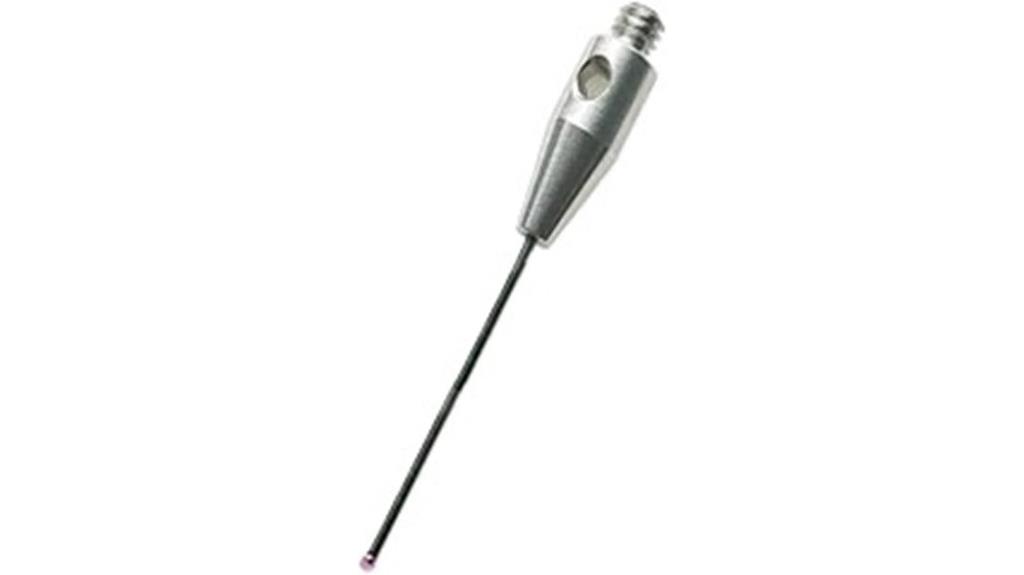
If you’re seeking a probe that delivers precise, reliable measurements for simple features, the Coordinate Probes A-5003-0577 M2 Thread Ruby 3D Gauge Meter is an excellent choice. Designed specifically for inspecting straightforward surfaces, it allows direct contact without obstructions, ensuring efficient and accurate readings. Made from high-quality, durable materials, the stylus resists wear from abrasive materials and offers a long service life. Manufactured under strict quality standards, it guarantees consistent performance, stability, and reliability. This probe is ideal for precise inspections in coordinate measuring applications, making it a dependable tool for ensuring measurement accuracy and efficiency.
Best For: professionals and technicians needing precise, reliable measurements of simple surfaces in coordinate measuring applications.
Pros:
- Designed specifically for inspecting straightforward features with direct contact.
- Made from high-quality, durable materials that resist wear and ensure long service life.
- Manufactured under strict quality control for consistent performance, stability, and reliability.
Cons:
- May not be suitable for measuring complex or highly intricate features.
- Requires proper handling and calibration to maintain accuracy over time.
- Might be more expensive than general-purpose probes due to its specialized design and durable construction.
Coordinate Probes 2.5mm 3mm 4mm OD M2 Thread
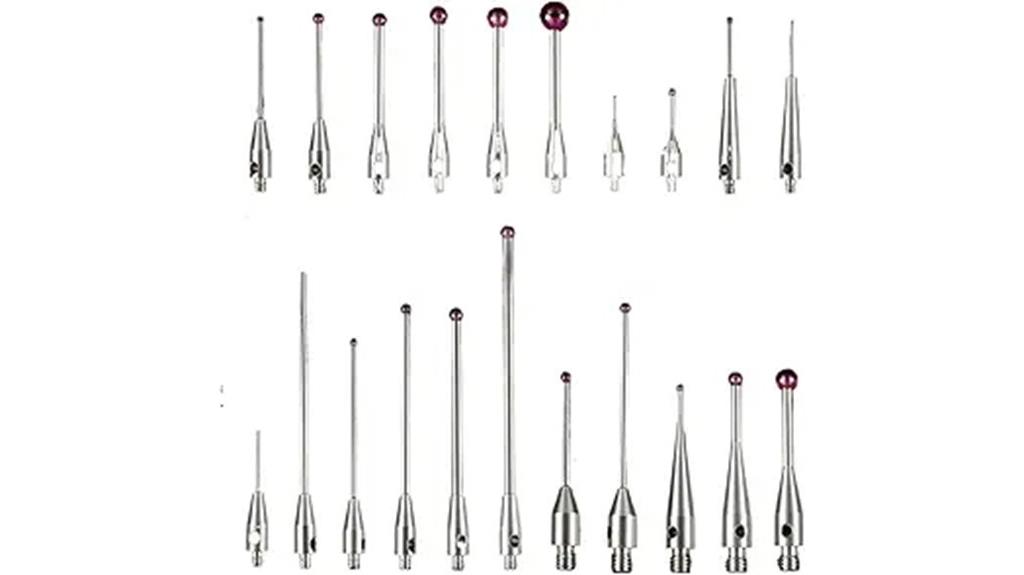
Looking to achieve precise and reliable measurements on simple features? The Coordinate Probes 2.5mm, 3mm, and 4mm OD M2 Thread are perfect for that. Made of durable ruby, these probes are designed for direct contact with measurement surfaces, ensuring accurate readings. They’re compatible with 3D coordinate measuring machines and come in three sizes to suit different requirements. With high-quality construction and strict manufacturing standards, they deliver long-lasting performance and stability. Compact and easy to use, these probes are ideal for quick, effective inspections, helping you maintain precision in your measurement tasks without hassle.
Best For: professionals and technicians requiring precise, reliable measurements of simple features using coordinate measuring machines.
Pros:
- Made of high-quality, durable ruby for long-lasting performance
- Designed for direct contact, ensuring accurate and unobstructed measurements
- Compatible with 3D coordinate measuring machines and available in multiple sizes
Cons:
- Limited to simple feature inspections, may not suit complex geometries
- Only available in three sizes, which may not cover all measurement needs
- Requires proper handling due to delicate ruby material to prevent damage
Coordinate Probes 2.5mm–4mm OD M2 Thread
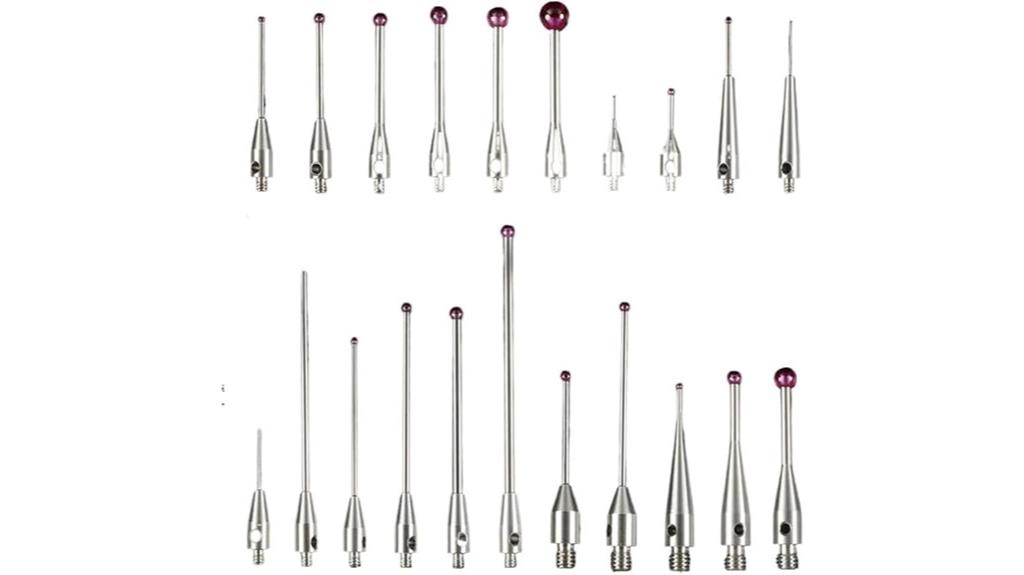
Coordinate probes with 2.5mm–4mm OD M2 threads are essential tools for precise surface inspection in quality control processes. These probes, available in 2.5mm, 3mm, and 4mm sizes, are designed for direct, unobstructed contact with surfaces, ensuring accurate measurements of simple features. Made from durable ruby material, they resist wear and provide long-lasting performance, even with abrasive materials. Their stable stylus design offers reliable performance during measurement tasks. Manufactured by CAARLA, these probes are compact, lightweight, and easy to handle, making them a reliable choice for maintaining high precision in your CMM inspections.
Best For: professionals performing precise surface inspections and quality control in manufacturing environments requiring accurate, durable probes for simple feature measurement.
Pros:
- Made from high-quality ruby for exceptional durability and wear resistance
- Available in multiple sizes (2.5mm, 3mm, 4mm) to suit various inspection needs
- Easy to handle with a compact, lightweight design for efficient use
Cons:
- Limited to simple feature inspection due to direct contact design
- M2 threaded connection may require specific compatible equipment
- Does not include assembly or additional accessories, requiring separate purchase for complete setup
Factors to Consider When Choosing Coordinate Measuring Machines (CMM)
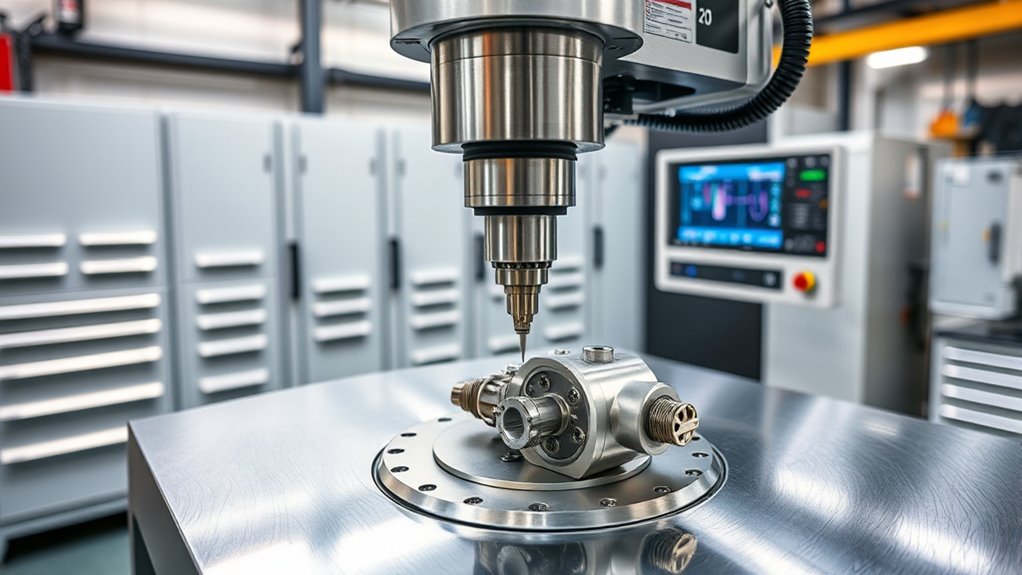
When selecting a CMM, I focus on measurement accuracy levels to guarantee precise results for my applications. I also consider portability features and probe compatibility to match my workflow needs. Additionally, I evaluate calibration procedures and cost to find a machine that fits my budget and maintenance requirements.
Measurement Accuracy Levels
Have you ever wondered how precise a CMM needs to be for your application? Measurement accuracy is usually expressed as the maximum permissible measurement error, often just a few micrometers, depending on the system’s class. Achieving higher accuracy involves advanced sensor technologies like laser or optical probes and rigorous calibration. Environmental factors—such as temperature changes, vibrations, and humidity—can impact measurement precision, so controlling these is essential. The choice of probe, like ruby or ceramic styluses, also influences accuracy by minimizing deformation and wear. Regular evaluations and adherence to industry standards, such as ANSI/ASME B89.4.22-2004, are critical to maintaining and verifying a CMM’s measurement accuracy over time. This guarantees reliable results aligned with your quality requirements.
Machine Portability Features
Choosing a portable CMM means focusing on features that make it easy to transport and set up across different environments. I look for lightweight materials like aluminum or composites that keep the machine manageable without sacrificing accuracy. Ergonomic designs, carrying cases, and shoulder straps help me move the CMM quickly between job sites. Battery-powered operation provides wireless flexibility, so I’m not limited by cords or power outlets. Compact dimensions and foldable or modular components make storage and transportation straightforward, especially for field measurements. Some models include integrated measurement accessories or mounts, enabling fast setup and reconfiguration on-site. These portability features guarantee I can perform precise measurements efficiently, whether in a factory, workshop, or remote location, without compromising on accuracy or ease of use.
Probe Compatibility Options
Ensuring probe compatibility is essential for accurate measurements and smooth operation with your CMM. First, I check that the probe’s thread size matches the machine’s probe holder, whether M2, M3, or M4. I also verify the tip material, like ruby or ceramic, to suit the surface type, ensuring durability and precision. The ball diameter and length are critical for reaching tight or complex features within the working envelope. I consider whether the stylus configuration—straight or angled—fits the specific measurement tasks. Lastly, I confirm the probe’s compatibility with the CMM’s control system and software, which guarantees seamless integration and reliable data collection. Proper probe compatibility optimizes measurement accuracy and minimizes troubleshooting, making it a crucial factor in choosing the right CMM.
Calibration Procedures Needed
Selecting a CMM requires careful attention to its calibration procedures to guarantee accurate and reliable measurements. Proper calibration involves using certified artifacts like gauge blocks or ball plates to verify the machine’s accuracy. These procedures should adhere to international standards such as ISO 10360 or ASME B89.4.22-2004 to ensure consistency. Regular calibration intervals depend on usage frequency, environmental factors, and measurement precision needs. The process typically checks for geometric errors like volumetric accuracy, straightness, and perpendicularity, with adjustments made as needed. Documenting calibration results—including deviations and corrective actions—is vital for traceability and compliance with quality management systems. Ensuring these procedures are followed guarantees your CMM maintains peak performance over time.
Cost and Budget Limits
Budget constraints play a pivotal role in determining which CMM best fits your needs, often guiding you toward manual, CNC, or portable options that offer the best balance of cost and functionality. High-precision articulated arm CMMs with advanced features tend to be more expensive, so a careful cost-benefit analysis is essential to guarantee they align with your project requirements. Keep in mind that the total cost includes not just the initial purchase but also ongoing expenses like maintenance, calibration, and potential upgrades over time. Lower-cost CMMs may lack some advanced features, limiting their effectiveness for complex or high-accuracy tasks. Setting a clear budget upfront helps narrow your options, ensuring you select a model that delivers the right measurement precision within your financial limits.
Frequently Asked Questions
What Are the Main Differences Between Manual and Automated CMMS?
Manual CMMs require an operator to physically move the probe and take measurements, offering flexibility but relying on skill and consistency. Automated CMMs, on the other hand, use software and robotic systems to perform measurements with minimal human intervention, increasing accuracy and repeatability. I find automated systems ideal for high-volume, precision tasks, while manual CMMs suit quick, on-the-spot inspections.
How Does Environmental Stability Impact CMM Measurement Accuracy?
Environmental stability is vital for accurate CMM measurements because fluctuations in temperature, humidity, or vibrations can cause material expansion or contraction, leading to errors. When the environment is stable, the CMM’s readings become more reliable and precise. I always make certain the measurement area is controlled, as even minor changes can considerably impact the accuracy of the data collected. This attention to environmental factors helps maintain measurement integrity.
What Maintenance Is Required to Ensure Long-Term CMM Precision?
To keep my CMM precise over the long term, I perform regular calibration checks and guarantee it’s kept clean and dust-free. I also monitor environmental conditions like temperature and humidity, since fluctuations can affect accuracy. Lubricating moving parts and inspecting for wear helps prevent issues. Finally, I follow the manufacturer’s maintenance schedule, including software updates, to maintain ideal performance and reliability.
How Do Software Features Enhance CMM Measurement Capabilities?
Software features greatly boost a CMM’s measurement capabilities by enabling advanced analysis, automated data collection, and real-time error detection. I rely on features like calibration routines, geometric tolerancing, and reporting tools to improve accuracy and efficiency. These tools help me identify issues early, streamline measurements, and ensure consistent results. Overall, they make my CMM more precise, reliable, and easier to operate, saving time and reducing errors.
What Training Is Recommended for Operators of Advanced CMM Systems?
Think of operating an advanced CMM like mastering a musical instrument—you need the right training to hit all the right notes. I recommend hands-on workshops, focusing on system calibration, software navigation, and troubleshooting. Additionally, online courses and manufacturer-led training sessions are invaluable. Regular practice and staying updated on software updates guarantee you stay in tune, delivering precise measurements with confidence and reliability every time you use the machine.
Conclusion
When choosing a CMM, remember that precision isn’t just a goal—it’s the foundation of trust in your measurements. Like a finely tuned instrument, the right machine adapts seamlessly to your needs, ensuring reliability every time. So, don’t just pick any; select one that resonates with your goals. After all, in the world of accuracy, isn’t it worth investing in a tool that’s as committed to perfection as you are?





